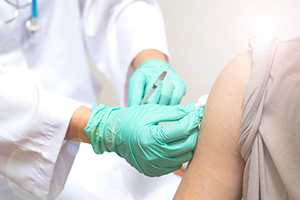In a study reported in JCO Oncology Practice, Failing et al found that influenza vaccination did not increase the incidence of immune-related adverse events among patients receiving pembrolizumab for various cancers. On multivariate analysis, influenza vaccination was associated with a significantly reduced risk for immune-related adverse events.

Photo credit: Getty
As noted by the investigators, “There is a concern that influenza vaccination could increase the incidence of immune-related adverse events in patients with cancer receiving immune checkpoint inhibitors.”
Study Details
The study involved data from 162 patients with cancer who received at least one dose of pembrolizumab at the Mayo Clinic, Rochester, during any influenza season from September 2014 to August 2017. Among these, 70 (43.2%) received at least one influenza vaccination. Those who received vaccination were older (median age = 68.6 vs 59.5 years, P = .002) and received more cycles of pembrolizumab (median = 14 vs 9.5, P = .006). Among all patients, the most common cancer type was melanoma (56.2%).
Incidence of Immune-Related Adverse Events
The incidence of any-grade immune-related adverse events was 25.7% in the vaccinated group vs 40.2% in the nonvaccinated group (P = .07). Grade 3 or 4 immune-related adverse events occurred in 5.7% vs 13.0% (P = .2). No grade 5 events were reported. On multivariate analysis, vaccination was associated with a significantly reduced risk of immune-related adverse events (odds ratio = 0.4, 95% confidence interval = 0.2–0.9, P = .03).
KEY POINTS
- On multivariate analysis, receipt of influenza vaccine was associated with reduced risk of immune-related adverse events.
- Any-grade immune-related adverse events occurred in 25.7% of the vaccinated group vs 40.2% of the nonvaccinated group.
Number of pembrolizumab cycles, age, sex, and type of cancer (melanoma, non–small cell lung cancer, or other) were not significantly associated with the occurrence of immune-related adverse events. In analysis with death as a competing risk, 12-month rates of immune-related adverse events were 24.7% in the vaccinated group vs 34.4% in the nonvaccinated group (P = .05). The median immune-related adverse event–free duration was not reached in the vaccinated group vs 28 months in the nonvaccinated group (P = .037).
The investigators concluded, “Influenza vaccination in patients with cancer receiving immune checkpoint inhibitor therapy was not associated with increased immune-related adverse events. This supports the safety of influenza vaccination in this patient population.”
Hao Xie, MD, PhD, of the Division of Medical Oncology, Mayo Clinic, Rochester, is the corresponding author for the Journal of Oncology Practice article.
Disclosure: For full disclosures of the study authors, visit ascopubs.org.

